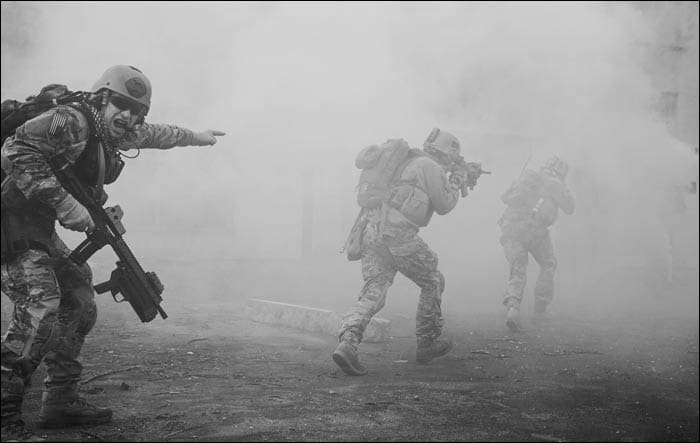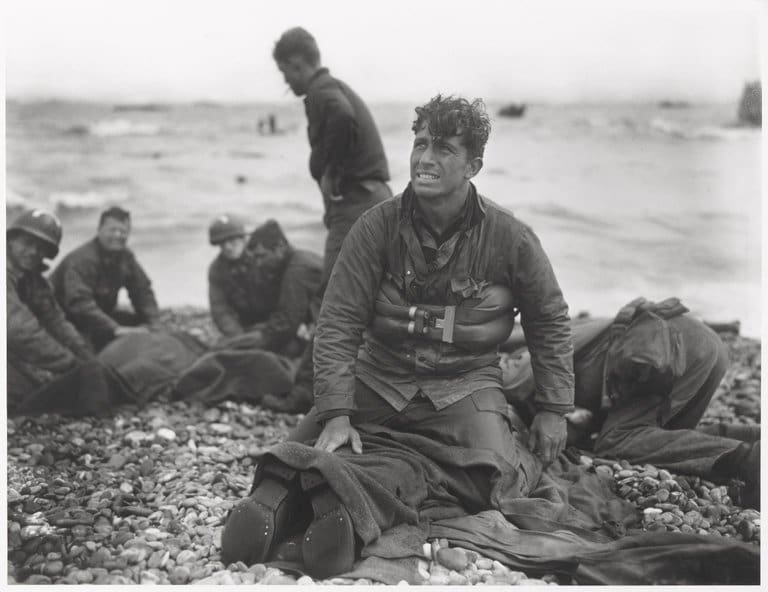A blog for Catholic men that seeks to encourage virtue, the pursuit of holiness and the art of true masculinity.
Leadership is Love

What is leadership? In a word, love. Leadership is love. If this assertion strikes you as odd at first, perhaps overly simplistic and dismissive of the grit and ire normally associated with “true” leadership, I imagine you are not alone. The argument, “Leadership is love,” sounds absurd juxtaposed to modern connotations that would have us believe “good” leadership is all about profitable decision-making, conformative example-setting, and dutiful managing.
Nowhere in mainstream literature will you find love as having anything to do with “effective” leadership, except maybe as an emotional afterthought by some who enlist to endeavor toward some collective goal. Modern love connotes carnal passion. It connotes physical intimacy and sensuality. In our culture, this love is shown as an intense feeling than as an essential nature of leadership. Modern love is a weak love.
Our society associates love more closely with sex than with leadership. The evidence of this is very clear. This weak notion of love is evident in our cinema. It is evident in our theater and song. It is evident in modern art. It is evident in the social sciences and psychology. In this postmodern age, there is no surer sign of love than one’s willingness – almost social obligation – to have sex. Even in our language we say a couple who is having sex is really just “making love.”
How we arrived here requires an understanding of deontological rationalism, the resultant tyranny of moral relativism, and the triumphant antagonism of those who championed a sexual revolution in the 1960s and 1970s. However, the point of this reflection is to derive one conclusion – “Leadership is love” – as shown by four logical arguments. The first is an argument from sacrifice. The second, an argument from ontology, which is the branch of philosophy dealing with essences and the nature of ‘Being.’ The third, an argument from the desired end, the attainment of good for others’ sake. The final argument is from God.
Defining Our Terms
First, let’s define our two terms. Love is to will the good of another, as other. This is a traditional definition and I make no attempt to substitute, or augment it. It is a definition attributed to St. Thomas Aquinas, who wrote in the mid-thirteenth century (STh II-I, 26, 4). The final clause of the definition, ‘…as other,’ is an important distinction. It is the material cause of love. The desired good of others “as other than us” (unselfish) is what causes love. Aquinas states, “[T]he cause of love must needs be love’s object. Now the proper object of love is the good, because as stated, love implies a certain connaturalness or complacency of the lover for the thing beloved, and to everything, that thing is a good…” (STh II-I, 27, 1). In other words, love in man is the movement toward a desired good for other men, not for oneself. The self is removed entirely from the effects.
Aquinas’ definition captures the simplicity and power of love far beyond anything written in recent times. The definition goes beyond simple feeling. It raises love over the lower of human acts, passion. It elevates love over the higher acts of the mind, intellect. His definition rightly places love as the arbiter between the heart and the mind by identifying it with the human will. Love is an act of the will.

This is a different love than what we depict in society. It is a tough love. Once, I described this sort of love to an uncanny group of men. I sat in a room of a maximum security federal penitentiary with hardened convicted military criminals. The men were housed at the U.S. Disciplinary Barracks at Fort Leavenworth, Kansas. Volunteering on a ministry team, I was scheduled to present in turn on a short topic of my choosing. I chose love.
“I am going to let you all in on a little secret of mine, since we are all now friends,” I started. “And friends tend to share secrets between one another. Are you ready to hear one of my secrets?”
I looked around the room and could tell my unusual start held everyone’s attention. I leaned forward in my chair to imitate a whisper, and said, “I love a good love story. Does anyone know any good love stories?”
Some of the men who sat forward in their chairs listening, intently, abruptly pulled back and crossed their arms. A few men snickered. Other ministry team members shifted uncomfortably in their seat, particularly the seasoned ones. I expected the awkward pause that followed my question, but I did not prepare the other volunteers. As I looked around the room in search of any takers, the most senior member of our volunteer group felt compelled to fill the silence and said, “Very good question Matt. Does, um, anyone have a good story to share?” A few chuckles followed.
One inmate recounted a story about a charming encounter he had with a young member of his family and how the event meant the world to him. This prompted another inmate to share a similar account involving his youngest child. However, once it became clear no one had any further stories to share, I said, “Thank you. Well, it just so happens I brought one of my favorite love stories and I hope no one here minds if I share it. Like all good love stories, it has a bit of a tragic ending, but here goes…”
And with that, I read the entirety of the Medal of Honor citation, awarded posthumously to Master Sgt. Gary I. Gordon, who distinguished himself by actions above and beyond the call of duty on October 3, 1993, with Task Force Ranger in Mogadishu, Somalia.
Master Sgt. Gordon and his teammate, Sgt. 1st Class Randall Shughart, volunteered to be inserted into a hostile situation after ground forces were not immediately available to secure a helicopter crash site where four critically wounded soldiers lay exposed to imminent danger. From the citation, I read, “Equipped with only his sniper rifle and a pistol, Master Sgt. Gordon and his fellow sniper, while under intense small arms fire from the enemy…pulled the pilot and the other crew members from the aircraft, establishing a perimeter which placed him and his fellow sniper in the most vulnerable position.”
I continued, “Despite the fact that he was critically low on ammunition, he provided some of it to the dazed pilot and then radioed for help.” I paused and looked intently around the room. This was a powerful moment of the citation and the gravity of it slowly set in. It was clear that the story had the effect I intended.
“Master Sgt. Gordon continued to travel the perimeter, protecting the downed crew. After his team member was fatally wounded and his own rifle ammunition exhausted, Master Sgt. Gordon returned to the wreckage, recovering a rifle with the last five rounds of ammunition and gave it to the pilot with the words, “good luck.” Then, armed only with his pistol, Master Sgt. Gordon continued to fight until he was fatally wounded. His actions saved the pilot’s life.”

At this, I stopped, looked around the room and held as many eyes as I could as I repeated Master Sgt. Gordon’s final words with measure and emphasis, “Good luck.” Then I added, “He might as well have said, ‘I love you.’” This was a different kind of love than of what the inmates were used to hearing.
Leadership is the exercise of authority and direction sustained by the will to pursue the common good of others, as other. If love is an act of will, leadership is an act of love. Like love, true leadership is a selfless service. The self is removed entirely from the effects. The closer one comes to true leadership, the closer he comes to pure love. In the following four sections, we will explore a deeper sense of how leadership relates to love.
Sacrifice
Leadership is love because both love and leadership require sacrifices. A sacrifice is the unconditional gift of a good or service rightly belonging to the one who freely gives for the sake of others. Sacrifices cost something of value for the sake of something even more valuable. Love is a sacrifice, since it wills the good of others for their sake, not for one’s own. Leadership is a sacrifice, since it costs time, effort, and energy, among other tangible and intangible things, to pursue the good of others for their sake, not for one’s own.
The efficient cause of leadership and love transact as a sacrifice. Leadership is a sacrificial service rendered out of love. Simply put, leadership is love. Look no further for evidence than to the sacrifice of Christ Jesus, who died on the cross out of love to lead us back into himself. Christ tells us there is no greater act of love than for one to lay down his life for his friends. I know this from firsthand experience. Army service is known for exemplary leadership, which in turn is a sacrifice. If my time-honored profession has taught me any good lesson worth sharing, it is to deem honorable the men and women who offered the fullest measure of devotion to love by sacrificing their lives for their friends. Their love leads others to follow.
Yet, it may be argued that some sacrifices are done for sake of duty. Is it not the Christian’s ultimate duty to love? Christ commanded that we must love God with all our heart, mind, soul, and strength, and to love our neighbor as ourselves. Sacrifices made for the sake of duty are made for the sake of love. If leadership is a sacrifice made of duty, than essentially it is made of love. Put simply, leadership is love.
Nothingness
Leadership is love because the absence of both leadership and love result in a formless vacuum. There is no ontological opposite of love. As previously stated, ontology is the branch of philosophy dealing with the essence and nature of being. Elie Wiesel, Holocaust survivor and Nobel Laureate, observed that “the opposite of love is not hate, its indifference.” Indifference leads to spiritual sloth so deeply entrenched into the human soul that it decays, over time leaving no feeling at all. Instead, we find individuals exhibit a flippant “whatever goes” mentality. In their thoughts and deeds, there is no sign of a love for truth, goodness, or beauty. The opposite of love is nothing since there is no ontological opposite to God, who is love. His essence is “being itself”, ipsum esse subsistens. The absence of love is like the absence of God. There is only darkness, a nothingness.

Like love, there is no ontological opposite of leadership. With the absence of leadership, we find a “whatever goes” mob-like tyranny. Where there is no leadership, there is lawlessness. There is no respect for natural or human law. There is no respect for truth, goodness, or beauty.
Pure love and true leadership exist perfectly in God, as will be shown later. As the two virtues descend from the ideal down to angels first, then to man, the rational animal, finally to the lowest form of creature, beasts, they wane in perfection until they cease to exist. Where love ceases in man, we observe hatred, anger, and malice that perverts goodness, truth, and beauty. Where leadership ceases among men, we observe anarchy, lawlessness, and mob-like passions that pervert the orderly, structured, and stable. Pure love and true leadership exist perfectly in God, imperfectly in man and beasts, and nowhere else in nature. They share a common essence between one another, since they both exist perfectly in the divine essence. In other words, leadership is love.
Aimimg at the Good
Leadership is love because the proper aim of both is the good. Just as we should not love things and use people, but love people and use things, we should likewise not lead things (e.g. businesses, organizations, units) and use people. Instead, lead people and use things. The Catechism of the Catholic Church states, “Love causes a desire for the absent good and the hope of obtaining it; this movement finds completion in the pleasure and joy of the good possessed” (CCC 1765). A mature love desires to see others united to a common good, which is the final cause of love. Mature leadership exercises authority and direction in pursuit of the common good, which is the final cause of leadership.
A business leader might sometimes forget that he is a leader of men, not of an amorphic business. His choices must always aim for the common good of his employees, not the business. A good business leader understands that it is happy employees who produce good results, not his authority, or direction. He rightly orders his activities to pursue the common good of others, and not exclusively good results. It is a principle of first and second things.

Likewise, military commanders understand this principle of “pursuing good for others’ sake, not for the sake of the thing itself” that is inextricably linked to leadership and love. Steven Pressfield summarizes this principle in his novel, Gates of Fire. Pressfield writes, “When a warrior fights not for himself, but for his brothers, when his most passionately sought goal is neither glory nor his own life’s preservation, but to spend his substance for them, his comrades, not to abandon them, not to prove unworthy of them, then his heart truly has achieved contempt for death, and with that he transcends himself and his actions touch the sublime.” The aim of leadership is to unite others to a common good, which is the desire that moves love into action. Leadership’s aim is that of love’s desire. Put simply, leadership is love, for they cooperate in helping all men reach our ultimate end – to be with God forever.
The Trinity
Leadership is love because within God we find pure love and perfect leadership. Jesus is led by the divine will of the Father to exercise divine authority and direction to bring about good for all mankind out of love. Leadership is in fact exercising authority and direction sustained by a will for the common good of all. We know that there are five notions in God – innascibility, paternity, filiation, common spiration, and procession. St. Thomas Aquinas explains in the Summa Theologiae, “A notion is the proper idea whereby we know a divine Person” (STh I, 32, 3) St. Thomas provides that the Father cannot be known by the fact that He is from another; but by the fact that He is from no other person; and therefore is called innascible. The Son is begotten of the Father, thus the Father is also known by paternity, and the Son by filiation. We believe Jesus Christ is the begotten Son of the Father, and the Holy Spirit proceeds from the love shared between the Father and Son, a notion calledcommon spiration.
God is love, which we defined earlier as willing the good of another, as other. Love is the very act of willing in God, for “God’s will is identical with the good willed by Him,” according to Aquinas. In the Bread of Life Discourse, Jesus stated, “I came down from heaven not to do my own will, but the will of the one who sent me” (Jn 6:38) (emphasis added). For God so loved the world, the Evangelist says, that He sent His only begotten son to accomplish His divine will. During his passion, Jesus prayed to the Father, “Not my will, but thy will be done” (Mt 26: 39,42; Mk 14: 36; Lk 22:42) (emphasis added). Leadership is love, because the Son does the will of the Father out of love.

Furthermore, the Father exercises divine authority by sending His Son to accomplish the divine will, as the Prophet Isaiah stated, “Just as from the heavens the rain and snow come down and do not return there till they have watered the earth…so shall my word be that goes forth from my mouth; it shall not return to me empty, but shall do what pleases me, achieve the end for which I sent it” (Is 55: 10a, 11). On this, Aquinas explains, “[T]he mission of the a divine Person is a fitting thing, as meaning in one way the procession of origin from the sender, and as meaning a new way of existing in another; thus the Son is said to be sent by the Father into the world, inasmuch as He began to exist visibly in the world by taking our nature” (STh I, 43, 1). The Son is led in the Father in the same manner the Beloved is in the lover, which is the same manner God is in Himself. Therefore, it is rightly viewed that leadership is love.
This can be difficult to see, but Jesus does not obey the Father in the same way I obey my military commanders. Rather, Jesus does the will of the Father in a more perfect way than I tell myself to do what I already know is right to do. Yet I do remind myself time and again to do what is good and avoid evil. I try to follow my conscience, even when it is difficult. At times, I must convince myself to do what is right, especially when doing wrong is so easy and appears more profitable. My will, imperfect though it is, acts as the soul’s arbiter between the heart and mind to lead my passions and intellect to do either right or wrong. The Father wills the Son to do what is good in His sight, and the Father’s word will not return to Him empty, but shall achieve the end for which He sent it. The Son is led in the Father, and therein leadership is love.
Conclusion
We know leadership is love from practical experience more than from logical or philosophical argument. St. Paul writes, “Love is patient, love is kind. It is not jealous, it is not pompous, it is not inflated, it is not rude, it does not seek its own interests, it is not quick-tempered, it does not brood over injury, it does not rejoice over wrongdoing but rejoices with the truth. It bears all things, believes all things, hopes all things, endures all things. Love never fails” (I Cor 13: 4-8a). It is not a stretch to substitute leadership for love and understand we want our leaders to be patient and kind. We want our leaders to avoid jealousy and pompousness. We do not want our leaders to be rude, quick tempered, or to brood over injury. St. Paul’s description of love provides us a profile of the perfect leader.
In my Veteran’s Day reflection posted in this site last November, I wrote that if you want to be a good leader, first, you must learn to love. My best advice to grow in your capacity to love is to put yourself at risk. Sacrifice something for the sake of others. Advance your subordinates ahead of yourself. Defend the weak and the most vulnerable, like the unborn. Be their voice. Do your job quietly, but with confidence and great joy. Be the face of Christ. Be humble. Do the right thing. And when you do wrong, as certain as you are human, go to confession, seek forgiveness from God, and from those who you have hurt. Leadership is love pure and simple. My fervent prayer for all men in our respective vocations for Christ is that we grow in our capacity to lead and to love.
A native of Staten Island, NY, Matthew Pride is currently serving as a U.S. Army active duty officer assigned to Fort Knox, Kentucky. In 2017, he earned a Masters of Military Arts and Science in Strategic Studies from the Army’s Command and General Staff College (CGSC) at Fort Leavenworth Kansas. His thesis work focused on Just War Theory. In 2012, he earned a Masters of Science in Engineering Management from the University of Missouri Science & Technology. In 2006, Matt graduated from the United States Military Academy (USMA) at West Point, New York. He and his wife, Christina, live in Elizabethtown, KY and together have four children. They are parishioners of Saint James Roman Catholic Church. Matthew is working to expand the ideas contained in this article into a book and welcomes opinion and feedback. Please send any thoughtful and constructive reflection to his personal email at [email protected].
Thank you! Thank you! Thank you! We are living in the Anti-Culture of Death, and the first casualty is True Love. They always talk about love and compassion, etc. but we live in a God-less therefore love-less society and that’s why it’s, as you said in the article, almost a requirement to always have sex and call it “love”. Promiscuity, pornography, political hatred and militancy, etc. are all distractions to the horrific fact that we live in an empty, love-less, leadership-less society. Truth opens the hope for True Change. Thank you!